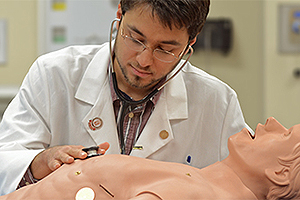El Paso Leads the Way in Clinical Simulation

Education through simulation improves future patient outcomes as students become doctors.
With a new accreditation, the Paul L. Foster School of Medicine has entered into an elite group of institutions.
The Center for Advanced Teaching and Assessment in Clinical Simulation (ATACS) at the Paul L. Foster School of Medicine is now one of only 27 simulation centers accredited by the Society for Simulation in Healthcare (SSH) and the only one in Texas. It is one of just 10 SSH-accredited simulation centers belonging to a school of medicine.
This accreditation ensures excellence in multi-specialty health care education, practice and research through simulation modalities on the El Paso campus.
“Simulation is still relatively new 15 to 20 years old,” said Hoi Ho, M.D., associate academic dean for faculty affairs and development, and director of the ATACS. “Prior to the establishment of the Society for Simulation in Healthcare, there were no standards in simulation.”
Established in 2004, the SSH represents the rapidly growing group of educators and researchers who utilize a variety of simulation techniques for education, testing and health care research.
Ho said the accreditation process began with a self-assessment of the program along with preparation of the application, which consisted of several hundred pages. Ho and his staff were tasked with proving they met or exceeded standards set by SSH, which included proof that the Paul L. Foster School of Medicine administration was dedicated to the growth and success of the center, and qualified staff were on hand to deliver teaching and training.
“This accreditation means that we mean business,” Ho said. “We are in the business of simulation and recognized for the best standards.”
Located on the third floor of the Paul L. Foster School of Medicine Medical Education Building, the 13,000-square-foot space uses advanced technology and equipment to support innovative learning methods for medical students and residents, which will ultimately translate into better patient care as students become doctors.
Through evaluation of the center, officials with the SSH recognized the ATACS for the amount of contact hours staff spent with students and the amount of heart they brought to the center.
“Each person on this team has contributed his or her best to this simulation center,” Ho said. “We don’t want to be second best. We want to be considered the leader in clinical simulation.”
Related Stories
How Does Your Garden Grow?
As spring approaches, some people’s thoughts turn to gardening. Whether it’s a flower garden they desire or a vegetable garden want to have, they begin planning what they’ll plant and what they need to do to ensure a successful garden.
Adopt a Growth Mindset for a Better Life
A “growth mindset” accepts that our intelligence and talents can develop over time, and a person with that mindset understands that intelligence and talents can improve through effort and learning.
Drug Use, Family History Can Lead to Heart Disease in Younger Adults
Abstaining from drug abuse and an early diagnosis of familial hypercholesterolemia (high cholesterol) can help prevent heart disease.
Recent Stories
The TTUHSC Laura W. Bush Institute for Women’s Health Welcomes Ben Carson as Power of the Purse Keynote Speaker
Retired neurosurgeon and former U.S. Secretary of Housing and Urban Development Ben Carson, M.D., delivered a keynote address at the Power of the Purse luncheon and fundraiser today (April 18).
Filling the Gap: PA Impact on Rural Health Care
Assistant Professor and Director of Clinical Education Elesea Villegas, MPAS, PA-C, spoke about the challenges rural health care currently faces and how PAs are stepping up to better serve the rural patient population.
School of Pharmacy Remembers Contributions of Key Collaborator
Cynthia Nash, Pharm.D., served as an Adjunct Assistant Professor of Pharmacy Practice for the School, and was an instrumental collaborator and key ally in our partnership with the Dallas VA North Texas Health Care System.
